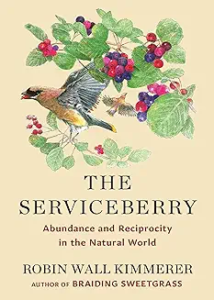The Serviceberry: Abundance and Reciprocity in the Natural World by Robin Wall Kimmerer 2024
Kimmerer, a registered member of the Citizen Potowatomi Nation, the Distinguished Teaching Professor of Enviornmental Biology at SUNY, and the author of the best-selling “Braiding Sweetgrass” has once again taken on the enormous challenge of trying to right our badly out of kilter world.
Using the example of a neighbor inviting folks into their orchard to pick as many serviceberries as they want, she contrasts a ‘gift economy’ with the conventional and world-wide economy of scarcity that has resulted in historical inequities in income, poverty, and conflict. The former is based on the abundance in the natural world versus the scarcity that is created by man in his endless search for profit, reciprocity and giving versus accumulation and greed, gratitude and connection rather than competition, generosity versus hoarding, enoughness versus ‘more’, relationships and community versus ‘I’.
Kimmerer is not a rose-colored, cockeyed optimist and realizes that changing the world is a mammoth task, but she believes in small steps and the power of changing the paradigm. Based in indigenous science and advocating the new field of ecological economics, she has committed to donating her advance payment for this book to land protection, restoration, and justice in support of ‘healing land and people.’ I was interested in her observations that some evolutionary biologists are questioning the primacy of competition and proposing that cooperation may have been an even more powerful driver of evolutionary success.
While we would do well to adopt her suggestions for a ‘gift economy’; sadly, the first three months of the current administration make that even less likely than ever. Nonetheless, it’s still an important book to read and even has a useful suggestion for what to do with those zucchinis that threaten to overrun your garden and house in the late summer.



